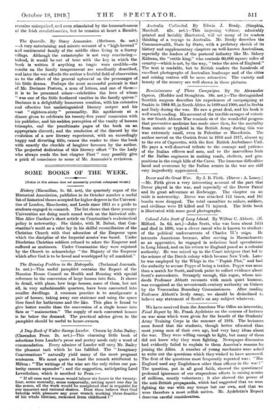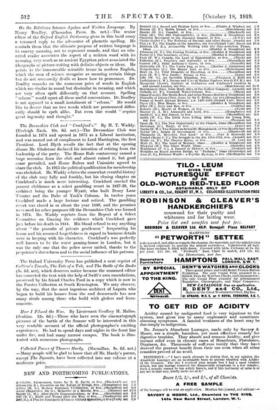SOME BOOKS OF THE WEEK.
[Notice in this Mums does not neccniWilai preCiniie subsequent PeniAllM
History (Macmillan, Is. 6d. net), the quarterly organ of the Historical Association, publishes in its October number a useful list of historical theses accepted for higher-degrees in the Universities of London, Manchester, and Leeds since 1911 as a guide to students engaged in research. The list shows that these younger Universities are doing much sound work on the historical side. Miss Alice Gardner's short article on Constantine's ecclesiastical policy is noteworthy. She thinks, with M. Babut, that Constantine's merit as a ruler lay in his skilful reconciliation of the Christian Church with that adoration of the Emperor upon which the discipline of the Imperial armies was based. Under Diocletian Christian soldiers refused to adore the Emperor and suffered as mutineers. Under Constantine they were enjoined by the Church to acknowledge " the Majesty of the Emperor which after God is to be loved and worshipped by all mankind."
The Housing Problem in the Metropolis. (Technical Journals. ls. net.)—This useful pamphlet contains the Report of the Mansion House Council on Health and Housing with special reference to the conversion of large houses into flats. It shows in detail, with plans, how large houses, Borne of them, but not all, in very unfashionable quarters, have been converted into smaller dwellings. A common practice is to amalgamate a pair of houses, taking away one staircase and using the space thus freed ler bathrooms esuLthe like. This plan is found to give better results than the conversion of a single house into flats or " maisonettes." The supply of such converted houses is far below the demand. The practical advice given in the pamphlet should be useful to house-owners.
A Day-Book of Walter Savage Landor. Chosen by John Bailey. (Clarendon Press. 2s. net.)—This charming little book of selections from Landor's prose and poetry needs only a word of commendation. Every admirer of Landor will envy Mr. Bailey the pleasant task which he has fulfilled. The " Imaginary Conversations " naturally yield many of the most pregnant sentences. We must quote at least the remark attributed to Milton : " The writings of the wise are the only riches our posterity cannot squander": and the suggestion, anticipating Lord Leverhulme, which is ascribed to Penn :—
If all men and women would labour six hours in the twentyfour, some mentally, some corporeally, setting apart one day in the seven, all the work would be completed that is requisite for our innocent and rational desires. Dost thou believe that God beholds with pleasure any poor wretch working three-fourths of his whole lifetime, reckoned from childhood ? " Australia Unlimited. By Edwin J. Brady. (Simpkin, Marshall. 42s. net.)—This imposing volume, admirably printed and lavishly illustrated, will sot many of its readers thinking of a voyage to Australia. Mr. Brady describes the Commonwealth, State by State, with a prefatory sketch of its history and supplementary chapters on well-known Australians, especially the leaders of the pastoral industry like Mr. Sidney Kidman, the "cattle king," who controls 60,000 square miles of country—which is not, by the way, " twice the area of England." The text is readable, but to British readers the hundreds of excellent photographs of Australian landscape and of the cities and mining centres will be more attractive. The variety and beauty of the scenery are well shown in these pictures.
Reminiscences of Three Campaigns. By Sir Alexander Ogaton. (Hodder and Stoughton. 16s. net.)—The distinguished Scottish surgeon describes his experiences of campaigning at Suakin in 1884-85, in South Africa in 1899 and 1900, and in Serbia and Italy during the war. He saw a great deal, and his book is well worth reading. His account of the terrible ravages of enteric in our South African War reminds us of the wonderful progress that preventive medicine has made since then, for the mortality from enteric or typhoid in the British Army during this war was extremely small, even in Palestine or Macedonia. The author served on the Gorizia front in 1916 and 1917, almost up to the eve of Caporetto, with the first British Ambulance Unit. He pays a well-deserved tribute to the courage and patience of the Italian officers and men, and to the marvellous feats of the Italian engineers in making roads, shelters, and gunpositions in the rough hills of the Carso. The immense difficulties faced and overcome by the Italian armies in the war are still very imperfectly appreciated.
Dover and the Great War. By J. B. Firth. (Dover : A. Leney.) —Mr. Firth gives a very interesting account of the part that Dover played in the war, and especially of the Dover Patrol and its great adventure at Zeebrugge. The chapter on air raids is noteworthy. Dover was attacked 113 times, and 1811 bombs were dropped. The total casualties to sailors, soldiers, and civilians were 23 killed and 71 injured. The little book is illustrated with some good photographs.
Colonel John Scott of Long Island. By Wilbur C. Abbott. (H. Milford. 5s. 6d. net.)—John Scott, who was born about 1631 and died in 1696, was a clever rascal who is known to students of the political undercurrents of Charles IL's reign. He interests Americans because, after serving in Massachusetts as an apprentice, he engaged in nefarious land speculations in Long Island, and on his return to England posed as a colonial authority. He was mixed up in the Court intrigues that led to the seizure of the Dutch colony which became New York. Later he was employed by the Whigs in the " Popish Plot," and had the audacity to accuse Pepys of being a traitor. Pepys was more than a match for Scott, and took pains to collect evidence about Scott's antecedents. Strangely enough, this rogue, whose misdeeds Professor Abbott recounts with much quiet humour, was recognized as the seventeenth-century authority on Guiana by the Venezuelan Boundary Commissioners. After reading Professor Abbott's lively essay, we should be disinclined to believe any statement of Scott's on any subject whatever.
We have received from the American War Office an interesting Final Report by Mr. Frank Aydelotte on the courses of lectures on war aims which were given for the benefit of the Students' Army Training Corps in the summer of 1918. The lecturers soon found that the students, though better educated than most young men of their own age, had very hazy ideas about the war. They were willing enough to fight, but many of them did not know why they were fighting. Newspaper discussion had evidently failed to explain to them America's reasons for joining the Allies. A number of young mechanics were asked to write out the questions which they wished to have answered. The first of the questions most frequently repeated was : "Has England used any Englishmen other than officers in the war ? " The question, put in all good faith, showed the questioners' profound ignorance of our stupendous efforts in raising armies of millions, mostly volunteers ; it also showed the power of the anti-British propaganda, which had suggested that we were fighting the war with any troops but our own, and that we were therefore a most selfish nation. Mr. Aydelotte's Report deserves careful consideration.
On the Relations between Spoken and Written Language. By Henry Bradley. (Clarendon Press. 2s. net.)—The senior editor of the Oxford English Dictionary gives in this lucid essay a reasoned reply to the advocates of phonetic spelling. He reminds them that the ultimate purpose of written language is to convey meaning, not to represent sounds, and that an educated reader associates the aspect of a written word with its meaning, very much as an ancient Egyptian priest associated the ideographs or picture-writing with definite objects or ideas. He points to the innumerable scientific terms in modern English, which the men of science recognize as meaning certain things but do not necessarily desire or know how to pronounce. Dr. Bradley remarks on the numerous pairs of words in English which are similar in sound but dissimilar in meaning, and which are very often spelt differently on that account. Spelling "reform" would upset all these useful conventions. Dr. Bradley is not opposed to a small instalment of " reform." He would like to decree that no two words which are pronounced differently should be spelt alike. But even this would " require great ingenuity and thought."
The Devonshire Club and "Crockford's." By H. T. Waddy. (Eveleigh Nash. 10s. 6d. net.)—The Devonshire Club was founded in 1874 and opened in 1875 as a Liberal institution, and was named out of compliment to Lord Hartington, the first President. Lord Blyth recalls the fact that at the opening dinner Mr. Gladstone declared his intention of retiring from the leadership of the party. The Home Rule controversy caused a large secession from the club and almost ruined it, but good sense prevailed, and Home Rulers and Unionists agreed to sham the club. In 1915 the political qualification for membership was abolished. Mr. Waddy relates the somewhat eventful history of the club very fully and frankly, but his closing chapter on Crockford's is much more interesting. Crockford erected the present clubhouse as a select gambling resort in 1827-28, the architect being the younger Wyatt, who built Drury Lane Theatre and the Duke of York'i Column. In twelve years Crockford made a large fortune and retired. The gambling resort was closed in or about the year 1849, and the premises were used for other purposes till the Devonshire Club was formed in 1874. Mr. Waddy reprints from the Report of a Select Committee on Gaming the evidence which Crockford gave just before his death in 1844. His bland refusal to say anything about " the pursuits of private gentlemen " frequenting his house and his assumed forgetfulness in regard to business details were in keeping with his character. Crockford's was perfectly well known to be the worst gaming-house in London, but it was the only one that the police never raided, thanks to the proprietor's shrewdness and to the social influence of his patrons.
The Oxford University Press has published a neat reprint of Cullirer's Travels, The Tale of a Tub, and The Battle of the Books (3s. Gd. net), which deserves notice because the unnamed editor has corrected the text with the help of Swift's own emendations, preserved by his friend Charles Ford in a copy which is now in the Forster Collection at South Kensington. We may observe, by the way, that the most ingenious architect of Laputa who began to build his houses from the roof downwards has now many rivals among those who build with girders and ferroconcrete.
How I Filmed the War. By Lieutenant Geoffrey H. Malins. (Jenkins. 12s. 6d.)—Those who have seen the cinematograph pictures of the battle of the Somme will be interested in this very readable account of the official photographer's exciting experiences. He had to spend days and nights in the front line under fire, and had many narrow escapes. The book is illustrated with numerous photographs.
Collected Poems of Thomas Hardy. (Macmillan. 8s. Gd. net.) —Many people will be glad to know that all Mr. Hardy's poems, except The Dynasts, have been collected into one volume at a moderate price.







































 Previous page
Previous page